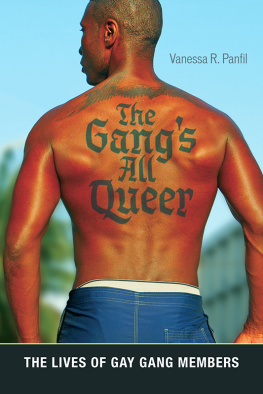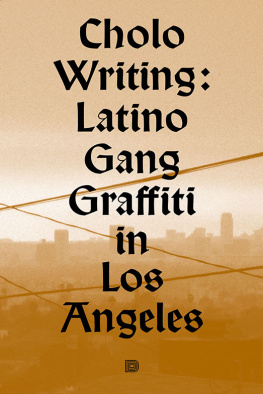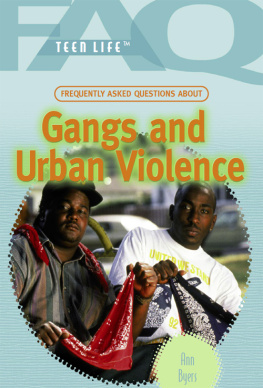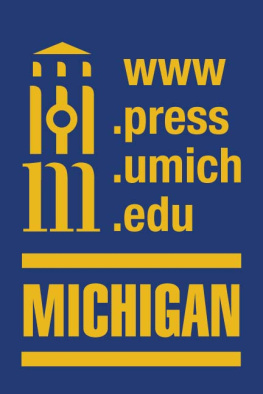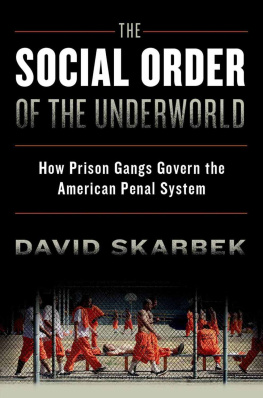Thank you for buying this ebook, published by NYU Press.
Sign up for our e-newsletters to receive information about forthcoming books, special discounts, and more!
Sign Up!
About NYU Press
A publisher of original scholarship since its founding in 1916, New York University Press Produces more than 100 new books each year, with a backlist of 3,000 titles in print. Working across the humanities and social sciences, NYU Press has award-winning lists in sociology, law, cultural and American studies, religion, American history, anthropology, politics, criminology, media and communication, literary studies, and psychology.
Gods Gangs
NEW YORK UNIVERSITY PRESS
New York and London
www.nyupress.org
2014 by New York University
All rights reserved
References to Internet websites (URLs) were accurate at the time of writing. Neither the author nor New York University Press is responsible for URLs that may have expired or changed since the manuscript was prepared.
LIBRARY OF CONGRESS CATALOGING-IN-PUBLICATION DATA
Flores, Edward Orozco.
Gods gangs : barrio ministry, masculinity, and gang recovery / Edward Orozco Flores.
pages cm
Includes bibliographical references and index.
ISBN 978-1-4798-5009-9 (hardback) ISBN 978-1-4798-7812-3 (paper)
1. Hispanic American gangsCaliforniaLos Angeles. 2. Ex-gang membersRehabilitationCaliforniaLos Angeles. 3. Ex-gang membersServices forCaliforniaLos Angeles. 4. Church work with Hispanic AmericansCaliforniaLos Angeles. 5. Church and social problemsCaliforniaLos Angeles. 6. Hispanic American menCaliforniaLos AngelesSocial conditions. I. Title.
HV6439.U7L725 2013
261.83310660979494dc23
2013020339
New York University Press books are printed on acid-free paper, and their binding materials are chosen for strength and durability. We strive to use environmentally responsible suppliers and materials to the greatest extent possible in publishing our books.
Manufactured in the United States of America
10 9 8 7 6 5 4 3 2 1
Also available as an ebook.
ACKNOWLEDGMENTS
This book could not have been possible without a great deal of personal and professional support from family, friends, and colleagues, all the way from California to Chicago. This book was a labor of love, each phase bringing me closer not only to academic truths, but also to the beauty that is found in having an ideal writing environment.
I will forever carry the memory of Victory Outreach and Homeboy Industries inspirational efforts. I was privileged to have been let into my respondents lives, and I wish there was some way to reciprocate and show my deepest appreciation. Over shared meals and small visits, they taught me how to be grateful for the most minimal of lifes gifts: homemade food, a simple prayer, or a big, warm handshake. These experiences blessed me with peace and joy as I engaged in the arduous, tedious, and tiring process of conducting research and writing. I was fortunate enough to have experienced a path of spiritual growth through academe.
I want to give thanks to several persons at the University of Southern California (USC). Immense gratitude goes to Pierrette Hondagneu-Sotelo, who provided unwavering support, as well as expeditious and instructive feedback. In addition, Hernan Ramirez, Glenda Marisol Flores, Lata Murti, and Emir Estrada provided a lively and inclusive environment in which to entertain core ideas that now form this book. I am also thankful to Kristen Barber, for her insightful feedback, which helped me to develop more nuanced analyses of Latino masculinity. And lastly, I would like to thank the John Randolph and Dora Haynes Foundation for a doctoral dissertation fellowship that allowed me to engage in data collection.
Just before the great leap from California to Chicago, I was met with an unexpected surprise. Dowell Myers, director of the Population Dynamics Research Group (PDRG) at USC, asked me to be his project manager for the summer. Little did I know that the work would not only be challenging, but exciting and rewarding, and that at the end of it I would have large U.S. Census and American Community Survey datasets ready and waiting to be used for this books demographic analysis. For this, I give thanks to Linda Lou, Hyojung Lee, and Anthony Guardado, fellow researchers at PDRG, for having helped with the construction of the data files.
I want to give thanks to colleagues at the Department of Sociology at Loyola University Chicago, as well. My department chair, Rhys Williams, structured a plan that worked well to help me finish a book as a new assistant professor. Several colleagues also provided an intellectually stimulating environment, critically examining a range of issues of inequality that made me much more ambitious in my aims: Tal Wright, David Embrick, and Kelly Moore. The religion working group, consisting of Rhys, Elfriede Wedam, Courtney Irby, Todd Fuist, Thomas Josephsohn, and Beth Dougherty, offered invaluable feedback concerning the themes embedded in this books focus on religion. As with all writing, however, any mistakes in this book are solely attributable to the author.
Endless thanks go to my immediate family for their social support. My parents, Maria Elena Orozco and Alberto Jimnez Flores, hail from la Sierraa rural, mountainous range in west-central Mexico that holds the substance from which myths are made. Their immense passion for learning and penchant for always finding new family stories to tell gave me the ideal background with which to enter into a Ph.D. program. They have an inexhaustible reservoir of oral history that always spills out at the dinner table, and as a result, I have been motivated to seek no other career but one dedicated to the pursuit of knowledge. They have a Ph.D. in our familys history, and mine is in sociology.
I want to thank my siblings, Judy, Josh, and Hazel, who have given me a great deal of support throughout my life. Judy has shared her wisdom as the first to go to college, Josh has a talent for making my visits home seem like just any other day, and Hazel gives me joy when she says it is her goal to follow in my footsteps. And, I would also like to acknowledge the Padillas. The Padillas are known for finding great ways to celebrate, and they were the first to celebrate my book contract. Grandma Ramona, Grandpa Ed, Maggie, Jesus, Yolanda, Michael, Jesse, Krystal, Kiko, Kenya, Jamie, and Caroline all created a lively environment in which to take a break from work.
My final words of gratitude are reserved for my partner, Ana Maria Padilla. Ana shares a keen interest in social justice issues, and in the short span of a few years I have received much more fulfillment than I could have dreamed. We never tire of talking about her expertise (organizing and research) or of mine, of inspiring stories, or of our daily frustrations. Ana has supported me, immeasurably contributing to the development of this book, by enduring the most noble of all sacrifices: moving with an academic to a cold, far-away state. For this Ana, I owe you my support. In the words of a Mario Benedetti poem, you are mi amor mi cmplice y todo.



